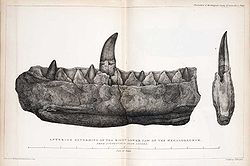
Inferior Oolite
Encyclopedia
The Inferior Oolite is a geological formation in Europe. It dates back to the Middle Jurassic
.
material. The Ammonite
Parkinsonia parkinsoni, an Index fossil
for the Bathonian, is native to the Inferior Oolite of Burton Bradstock
.
Middle Jurassic
The Middle Jurassic is the second epoch of the Jurassic Period. It lasted from 176-161 million years ago. In European lithostratigraphy, rocks of this Middle Jurassic age are called the Dogger....
.
Formation
The Inferior Oolite is an Oolitic limestone, a Sedimentary rock, meaning it was formed during lithication. The Inferior Oolite is rich in organicOrganic matter
Organic matter is matter that has come from a once-living organism; is capable of decay, or the product of decay; or is composed of organic compounds...
material. The Ammonite
Ammonite
Ammonite, as a zoological or paleontological term, refers to any member of the Ammonoidea an extinct subclass within the Molluscan class Cephalopoda which are more closely related to living coleoids Ammonite, as a zoological or paleontological term, refers to any member of the Ammonoidea an extinct...
Parkinsonia parkinsoni, an Index fossil
Index fossil
Index fossils are fossils used to define and identify geologic periods . They work on the premise that, although different sediments may look different depending on the conditions under which they were laid down, they may include the remains of the same species of fossil...
for the Bathonian, is native to the Inferior Oolite of Burton Bradstock
Burton Bradstock
Burton Bradstock is a village in south west Dorset, England. The village has a population of 979 . Situated on the Chesil Beach, east of Bridport the village nestles around the church of St...
.
Vertebrate fauna
Ornithopod tracks geographically located in North Yorkshire, England. Ornithopod and theropod tracks present in North Yorkshire, England.| Dinosaur Dinosaur Dinosaurs are a diverse group of animals of the clade and superorder Dinosauria. They were the dominant terrestrial vertebrates for over 160 million years, from the late Triassic period until the end of the Cretaceous , when the Cretaceous–Paleogene extinction event led to the extinction of... s of the Inferior Oolite |
||||||
|---|---|---|---|---|---|---|
| Genus | Species | Location | Stratigraphic position | Material | Notes | Images |
Cetiosaurus Cetiosaurus Cetiosaurus meaning 'whale lizard', from the Greek cetus/κητος meaning 'sea monster' and saurus/σαυρος meaning 'lizard', was a sauropod dinosaur from the Mid to Late Jurassic Period in what are now Europe and Africa. It is estimated to have been about long and to have weighed roughly... |
C. hypoolithicus |
|
   |
|||
C. longus |
|
|||||
|
C. medius |
|
|||||
|
Indeterminate |
|
|||||
|
Duriavenator Duriavenator Duriavenator is a genus of theropod dinosaur described in 2008 by Roger Benson. The type species is D. hesperis, formerly known as Megalosaurus hesperis. Duriavenator lived during the Bajocian stage, around 170 million years ago, making it one of the oldest-known tetanurans. The genus name combines... |
D. hesperis |
|
"Skull elements." |
|||
Magnosaurus Magnosaurus Magnosaurus was a genus of basal tetanuran theropod dinosaur from the Middle Jurassic of England. It is based on fragmentary remains and has often been confused with or included in Megalosaurus.-History and taxonomy:... |
M. nethercombensis |
|
"Dentaries, vertebrae, pubis, femora, [and] tibiae." |
|||
Megalosaurus Megalosaurus Megalosaurus is a genus of large meat-eating theropod dinosaurs of the Middle Jurassic period of Europe... |
M. bucklandii |
|
||||
|
M. hesperis |
|
"Skull elements." |
Moved to the new genus Duriavenator Duriavenator Duriavenator is a genus of theropod dinosaur described in 2008 by Roger Benson. The type species is D. hesperis, formerly known as Megalosaurus hesperis. Duriavenator lived during the Bajocian stage, around 170 million years ago, making it one of the oldest-known tetanurans. The genus name combines... in 2008. |
|||
Indeterminate |
|
|||||
|
Stegosaurus Stegosaurus Stegosaurus is a genus of armored stegosaurid dinosaur. They lived during the Late Jurassic period , some 155 to 150 million years ago in what is now western North America. In 2006, a specimen of Stegosaurus was announced from Portugal, showing that they were present in Europe as well... |
Indeterminate |
|
Later found to be indeterminate stegosaurid remains. |
|||

